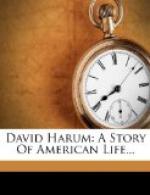CHAPTER XXXII.
Our friend’s acquaintance with the rector of St. James’s church had grown into something like friendship, and the two men were quite often together in the evening. John went sometimes to Mr. Euston’s house, and not unfrequently the latter would spend an hour in John’s room over a cigar and a chat. On one of the latter occasions, late in the autumn, Mr. Euston went to the piano after sitting a few minutes and looked over some of the music, among which were two or three hymnals. “You are musical,” he said.
“In a modest way,” was the reply.
“I am very fond of it,” said the clergyman, “but have little knowledge of it. I wish I had more,” he added in a tone of so much regret as to cause his hearer to look curiously at him. “Yes,” he said, “I wish I knew more—or less. It’s the bane of my existence,” declared the rector with a half laugh. John looked inquiringly at him, but did not respond.
“I mean the music—so called—at St. James’s,” said Mr. Euston. “I don’t wonder you smile,” he remarked; “but it’s not a matter for smiling with me.”
“I beg pardon,” said John.
“No, you need not,” returned the other, “but really—Well, there are a good many unpleasant and disheartening experiences in a clergyman’s life, and I can, I hope, face and endure most of them with patience, but the musical part of my service is a never-ending source of anxiety, perplexity, and annoyance. I think,” said Mr. Euston, “that I expend more nerve tissue upon that branch of my responsibilities than upon all the rest of my work. You see we can not afford to pay any of the singers, and indeed my people—some of them, at least—think fifty dollars is a great sum for poor little Miss Knapp, the organist. The rest are volunteers, or rather, I should say, have been pressed into the service. We are supposed to have two sopranos and two altos; but in effect it happens sometimes that neither of a pair will appear, each expecting the other to be on duty. The tenor, Mr. Hubber, who is an elderly man without any voice to speak of, but a very devout and faithful churchman, is to be depended upon to the extent of his abilities; but Mr. Little, the bass—well,” observed Mr. Euston, “the less said about him the better.”
“How about the organist?” said John. “I think she does very well, doesn’t she?”
“Miss Knapp is the one redeeming feature,” replied the rector, “but she has not much courage to interfere. Hubber is nominally the leader, but he knows little of music.” Mr. Euston gave a sorry little laugh. “It’s trying enough,” he said, “one Sunday with another, but on Christmas and Easter, when my people make an unusual effort, and attempt the impossible, it is something deplorable.”
John could not forbear a little laugh. “I should think it must be pretty trying,” he said.
“It is simply corroding,” declared Mr. Euston.




